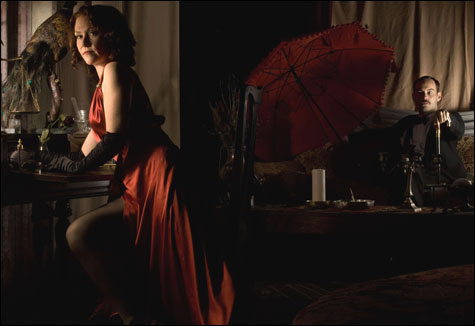
HECATE AND MALCOLM: The Scottish play takes on a new life — or many lives. |
Sleep No More, the second entry in the American Repertory Theater’s mini-season of revisionist Shakespeare, is the least orthodox production of Macbeth you’re likely to see. In fact, it’s linked to Macbeth as much by poetic allusion as by narrative — which is to say that it’s a little of both. Felix Barrett and Maxine Doyle of the British troupe Punchdrunk, who devised the show in collaboration with the ensemble, have created a site-specific series of episodes in various pockets of the Old Lincoln School in Brookline Village. You enter in groups determined by the number on the card you’re handed at the outset of the evening — along with a white mask that distinguishes the spectators from the staff (black masks) and the actors (no masks). Then you explore the four floors of the environment — long corridors, many rooms — according to any path you choose, so everyone’s experience is different. Some of the rooms I entered were full of décor but empty of performers; perhaps I’d missed them, or perhaps they were never there. And the order in which you see the scenes is random.
The mood is set by World War II ballads and Bernard Herrmann’s music from Alfred Hitchcock’s Vertigo (which feels ’40s-era even though it was written for a 1958 movie), and by the dim lighting and the creepy venue. An old schoolhouse is a perfect environment for a story of witches, ghosts, madness, and blood. Now, Macbeth is about other things, too, but you don’t get a sense of such themes as the line of succession or war — even though the soundtrack implies a wartime setting.
The production falls somewhere between intriguing and silly. For me, at least, it became more engaging as it went along. (For obvious reasons, it’s impossible to talk about Sleep No More with any degree of objectivity; I can only report on my own experience.) The first interaction I witnessed was between a desk clerk in a hotel lobby and a nervous young woman whose coat he slips off — as if he were preparing to make love to her — before disappearing with her suitcase. I followed her to the adjacent room, a salon where she sat opposite a man reading a newspaper. These living tableaux bore no obvious connection to Macbeth; they felt more like scenes from a J.B. Priestley play. It wasn’t till I happened upon the banquet in the school auditorium, which devolves into an orgy after the ghost of Banquo (Vinicius Salles) makes his unsettling appearance, that Sleep No More settled into some version of Shakespeare’s play.
There’s an approximation of Macbeth’s homecoming that begins with Lady Macbeth (Sarah Dowling) reading his letter — the only lines from the text I heard all night — and ends with her having athletic sex with her husband (Geir Hytten) in every corner of the room. The Witches (Conor Doyle, Stephanie Eaton, and Fernanda Prata) hold a strobe-lit Black Sabbath in one of the basement rooms that reminded me of many evenings I spent in the theater in the late ’60s and early ’70s. You get to stroll through Birnam Wood — a dark chamber full of fir trees and, for me, the sensual highlight of the performance. And there’s a very unsettling version of Lady Macbeth’s sleepwalking scene where she’s attended by a nurse in a hospital ward and we enter her diseased consciousness as she flails about desperately in a bathtub full of bloody water.